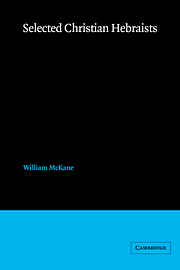Book contents
- Frontmatter
- Contents
- Preface
- List of abbreviations
- Introduction
- 1 The foundations
- 2 Andrew of St Victor
- 3 William Fulke and Gregory Martin
- 4 Richard Simon
- 5 Alexander Geddes
- Conclusion
- APPENDICES
- Notes
- Select bibliography
- General index
- Index of modern authors
- Scripture references
- Index of early Christian Literature
3 - William Fulke and Gregory Martin
Published online by Cambridge University Press: 18 December 2009
- Frontmatter
- Contents
- Preface
- List of abbreviations
- Introduction
- 1 The foundations
- 2 Andrew of St Victor
- 3 William Fulke and Gregory Martin
- 4 Richard Simon
- 5 Alexander Geddes
- Conclusion
- APPENDICES
- Notes
- Select bibliography
- General index
- Index of modern authors
- Scripture references
- Index of early Christian Literature
Summary
Between Andrew of St Victor and William Fulke there lies the Renaissance and the Reformation. Both contribute to Fulke's attitudes to biblical scholarship in which a pursuit of the original languages of the Bible is mixed with a theological concern: to possess in an English translation made from Hebrew and Greek the best approximation to the mind of the Holy Spirit. A scientific temper directed to textual and linguistic matters is taken up into a theological view that the authority of the Bible is supreme, that it should be given to the people, and that the Church should be reformed in agreement with it. The Bible is a powerful agent of change to which the Church must yield where it is at variance with it.
The reaction to this movement and mood appears in Gregory Martin. For the most part his Catholic conservatism does not match the Renaissance ideals of Fulke's textual and linguistic scholarship. He has a distaste for vernacular versions of the Bible and he rests on the authority of the Vulgate, though he has both Hebrew and Greek. He regrets the necessity of having to supply an English translation from the Vulgate, but he concludes sadly that the missionary situation of the Roman Catholic Church in England makes it imperative. He is suspicious of Protestant translations of the Bible into English which make Christian theology popular rather than learned. His preference is that the world might stand still or return to yesterday, and that the scriptures might be available only to those with a mastery of Latin, the international language of learning.
- Type
- Chapter
- Information
- Selected Christian Hebraists , pp. 76 - 110Publisher: Cambridge University PressPrint publication year: 1989



